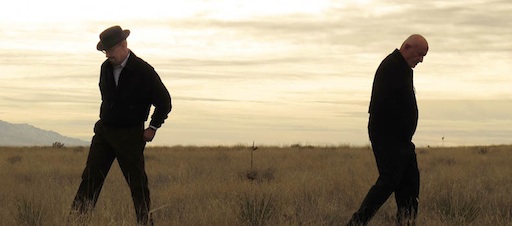With “Full Measures,” Breaking Bad wrapped up its third season confident of its place as the best drama on television all year. With one of the most focused and intense episodes, season three concluded with a bang.

Check the temperature of your tea and enter spoiler country after the break…
Back at the beginning of this season, Jesse confidently knew that he was “the bad guy,” while Walter believed that he was still a good man, forced into making difficult life choices to save his family if he would die from cancer.
In “Fly,” Walt was very aware that he’d fallen far deeper into the meth game than he ever intended to, that he wanted to make money to support his family before he succumbed to his cancer or got caught. Instead, surgery bought him more time and his cook skills brought him more money than he ever intended. But what motivated Walt was not always so much about the money as about the freedom and power that he enjoyed as a player in the meth trade.
Walt likes to control his situation, whether it’s cutting the crusts off of his peanut butter and jelly sandwiches, respecting the chemistry, or running a drug manufacturing operation. And he didn’t get into the rug game to be an employee, even a well-paid employee. Walt has a combination of pride and stubborn determination to be a control freak. It’s what kept him from taking money from Gretchen and Elliot to pay for his cancer treatment back in season one.
Besides being stubborn, Walt is also intensely devoted to his family. He is willing to do whatever he needs to make sure that his family is provided for. And over the course of the series, he’s come to regard Jesse as family. They may not always like each other, but they’re a sort of family. Even if the reason that Walt cut Jesse in on his deal with Gus was as much practical, so as to keep Pinkman from flipping on him to the DEA, or guilt over Jane rather than familial, Walt has undoubtedly come to have a sort of father-son relationship.
After all, Walt was willing to commit murder to save Jesse. And then, even with the imminent threat of Gus’s street dealers and their firearms, Walt was prepared to take care of Doug Gale to give him leverage with Gus. Walt has fallen to the point where he’s willing to premeditate murder for personal business advantage, like a Tony Soprano, Avon Barksdale or Marlo.
And although Jesse started off the season coming out of rehab fully comfortable with the idea that he was now the bad guy, Jesse remained the more human, emotionally grounded member of this pair. Jesse was not prepared to commit murder, until he realized that doing so would be the only thing that might possibly keep both himself and Walt alive, even if it required killing a Subaru-driving, infrared-thermometer using recombinant bicycle owner and chemist.
If there is one thing consistent about Breaking Bad, it is the story of people always making the wrong life choices. From Walt initially deciding to cook crystal meth, to Skyler coming into the business as a money launderer, on to murder, Walt’s break bad has not only affected his own sense of morality, but corrupted or injured everyone around him. Hank was grievously injured. Jesse lost his love. Skyler F’d T.
Season three continued to make the best use of the Albuquerque landscape to full effect, giving the show a very different look than anything else on TV. It was still willing to take moments to let the visuals wash over the screen rather than filling each episode with the maximum possible amount of story.
But what distinguished season 3 from the earlier two was the depth of performances. Bryan Cranston continued to do Emmy-deserving work, as did Aaron Paul. (See especially Paul’s monologue in “One Minute”.) Dean Norris continued to flesh out Hank as a fully-formed character. Anna Gunn had the opportunity to play new sides of Skyler (particularly the closing scene of “I.F.T.” and in “I See You.”) Betsy Brandt developed Marie into a character. Bob Odenkirk kept Saul Goodman as hilarious and pathetic as possible while still feeling completely real and part of the world. Giancarlo Esposito and Jonathan Banks delivered tremendous work as Gus and Mike.
All in all, Breaking Bad had the best season of any show on TV this year.
Links, analysis and interviews:
Alan Sepinwall, HitFix, The return of Heisenberg’s uncertainty principle, “What an intense, riveting finale to a season that belongs in the pantheon of all-time great years for a TV drama. We wisely dropped all side stories like Skyler’s attempt to be the new Danny or Marie and Hank’s mental battle over his rehab and focused entirely on the stalemate between Walt and Gus.”
Alan Sepinwall, HitFix, Interview: ‘Breaking Bad’ creator Vince Gilligan post-mortems season three, “We’re actively moving these chess pieces around, not so much playing 10 or 15 or 20 moves ahead, but we are kind of running for our lives. It’s scary. I don’t want it to sound like it’s a slapdash operation. It doesn’t feel that way when we’re doing it. We put a lot of thought into everything, and we try to play the game several moves ahead. But we’re only human, and it’s tricky sometime.”
Daniel Fienberg, HitFix, Bryan Cranston discusses the ‘Breaking Bad’ season, “The first season is about the decision — What does that do? What does that mean, the decision that he’s made? How is he going to go about becoming a manufacturer? What does he need to learn? Things like that. The second season was truly about the ramifications of that decision — What’s the ripple effect that occurred that he wasn’t prepared for? This last season was about accepting himself. What he realized he had to do was embrace the dark side of his character in order to survive this world of crime.”
Donna Bowman, The AV Club, “Full Measure,” “Tonight’s finale should cement this season of Breaking Bad as one of television’s finest dramatic accomplishments. And what makes it so exciting — what makes the recognition of the current golden age so pressing — is that the season has not been, as Noel put it in another context, ‘television good.’ The heart-in-the-throat quality of this season comes as much from the writers’ exhilarating disregard or television conventions as from the events portrayed. Every cliffhanger produced anticipation that often as not was subverted by having what came after timed at a jagged off-angle from the shape we’ve internalized as expectation.”
Noel Murray, The AV Club, Interview: Vince Gilligan: ” So much of the job really with a show like this is realizing that if the audience can see what’s coming, they’re not gonna enjoy it as much. Our job really is about surprising the audience, and it makes me very happy when we’re able to do that.”
Tim Goodman, SF Chronicle, “Breaking Bad” Spoiled Bastard. Ep. 13, season finale: “Full Measure” “What’s the full measure of a man? It seems that, consciously or not, that’s been one of the root questions of ‘Breaking Bad,’ which ended its Season 3 run as emphatically brilliant as the previous two (and has been renewed for Season 4, if there was any doubt). What a person will do, what he or she is made of, has been explored in all three seasons in myriad ways. Walt has already measured out the composition of a human being and found that all the ingredients came up just slightly shy of 100 percent. What was missing?”
James Poniewozik, Time, Breaking Bad Watch: Nowhere to Go But Up: “The story of Breaking Bad has been the story of Walter White crossing thresholds. It’s been a journey with him down a descending corridor leading further into his damnation, as he approaches one door after another and crosses—maybe with trepidation, maybe with doubt, maybe with wracking guilt afterward, but he crosses.
Nick Catucci, NY Magazine, Breaking Bad Season-Finale Recap: Why Be Cautious?, “What kind of man was Walter White before he got cancer and embarked on a life of crime? Clean-shaven, almost poofy-haired, black-leather-jacketed — and brimming with confidence and ambition.”
Myles McNutt, Cultural Learnings, Season Finale: Breaking Bad – “Full Measure” “The result is a fairly simple tragedy with less than simple ramifications, as ‘Full Measure’ uses the show’s trademark tension to cap off a stunning season of television which went on a run that is most certainly not over as the series heads towards its fourth season with an obnoxious amount of momentum.”
The Chicago Tribune’s Maureen Ryan watched the entire season over the weekend. You can see her transformation from skeptic to supporter: Part 1, Part 2, Part 3.
